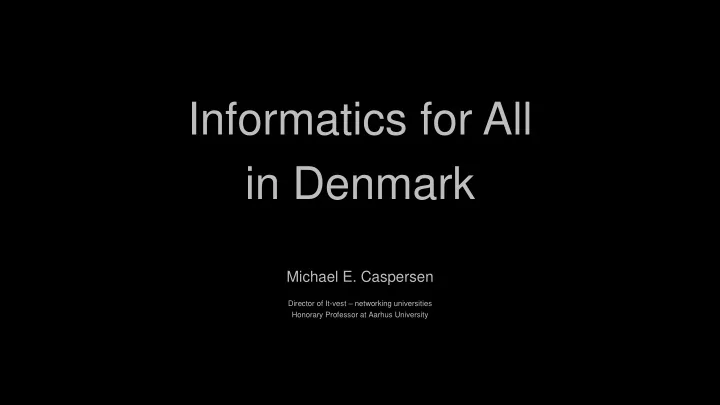

Informatics for All in Denmark Michael E. Caspersen Director of It-vest – networking universities Honorary Professor at Aarhus University
Emerging political awareness in DK • January 2016 World Economics Forum, Davos (4 th Industrial Revolution) • • December 2016 • Report from The Danish Growth Council (on qualified labour) • “Computational thinking for all” (one of five “here and now recommendations) • May 2017 • Report from Digital Growth Panel • Entire section on digital competencies • January 2018 • The Government: Strategy for Denmark’s digital growth • Several concrete actions: Informatics in K-9 , … • March 2019 • On March 14 th , the Government hosts Digital Summit 2019 • Presentation of K-9 Informatics and discussion of further initiatives • Plenty of lobbying along the way…
Informatics for All in Denmark • Two-tier strategy at all educational levels (more or less explicit) 2018 1 Higher education: as AND in study programmes Age: ~ 19-24 + 2016 2 Upper secondary school: as AND in subjects Age: ~ 16-19 as OR in subjects ! ( AND) 2018 3 Primary and lower secondary: Age: ~ 6-16 1 Awareness since 2018. 2 Long history as optional subject; see Computational Thinking and Practice – A Generic Approach to Computing in Danish High Schools for further details. 3 Curriculum developed in 2018; made public on 21 st December 2018. Trial subject for three years (2019-2021) in 46 selected schools; associated implementation project...
Informatics in K-9 (new trial subject) • Current designation • 'Teknologiforståelse' (~ Technology comprehension) • Four competence areas • Computational empowerment Novel and complementary informatics topics • Digital design and design processes • Computational thinking “Traditional” informatics topics • Technological knowledge and skills • Two lessons per week in all grades
Four Competence Areas 1. Computational empowerment Critical, reflexive and constructive examination and understanding of possibilities and consequences of digital artefacts. Analysis of technology — intention and use | Evaluation | Redesign 2. Digital design and design processes Organisation and implementation of iterative and incremental design processes considering the context of future use. 1 Problem framing | Ideation | Prototyping | Argumentation 3. Computational thinking Analysis, modelling and structuring of data and data processes. 2 3 Data | Algorithms | Structuring | Modelling 4. Technological knowledge and skills 4 “Mastery” of digital technologies (computer systems and networks), associated languages and programming. Programming | Computer systems | Network | Security
Informatics (aka 'Teknologiforståelse') Computationel Problem specific use and interpretation Digital artefacts concepts (decoding) 1 Analysis & Abstraction Design & Construction Computationel modelling 2 3 (encoding) Concrete Digital technology phenomena 4 Referent System Computational (Domain) Model System
Recommend
More recommend